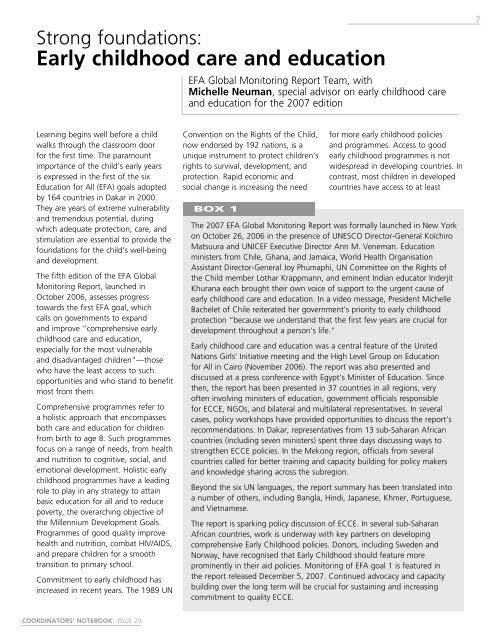A global call to action for early childhood
A global call to action for early childhood
A global call to action for early childhood
Create successful ePaper yourself
Turn your PDF publications into a flip-book with our unique Google optimized e-Paper software.
Strong foundations:<br />
Early <strong>childhood</strong> care and education<br />
EFA Global Moni<strong>to</strong>ring Report Team, with<br />
Michelle Neuman, special advisor on <strong>early</strong> <strong>childhood</strong> care<br />
and education <strong>for</strong> the 2007 edition<br />
7<br />
Learning begins well be<strong>for</strong>e a child<br />
walks through the classroom door<br />
<strong>for</strong> the first time. The paramount<br />
importance of the child’s <strong>early</strong> years<br />
is expressed in the first of the six<br />
Education <strong>for</strong> All (EFA) goals adopted<br />
by 164 countries in Dakar in 2000.<br />
They are years of extreme vulnerability<br />
and tremendous potential, during<br />
which adequate protection, care, and<br />
stimulation are essential <strong>to</strong> provide the<br />
foundations <strong>for</strong> the child’s well-being<br />
and development.<br />
The fifth edition of the EFA Global<br />
Moni<strong>to</strong>ring Report, launched in<br />
Oc<strong>to</strong>ber 2006, assesses progress<br />
<strong>to</strong>wards the first EFA goal, which<br />
<strong>call</strong>s on governments <strong>to</strong> expand<br />
and improve “comprehensive <strong>early</strong><br />
<strong>childhood</strong> care and education,<br />
especially <strong>for</strong> the most vulnerable<br />
and disadvantaged children”—those<br />
who have the least access <strong>to</strong> such<br />
opportunities and who stand <strong>to</strong> benefit<br />
most from them.<br />
Comprehensive programmes refer <strong>to</strong><br />
a holistic approach that encompasses<br />
both care and education <strong>for</strong> children<br />
from birth <strong>to</strong> age 8. Such programmes<br />
focus on a range of needs, from health<br />
and nutrition <strong>to</strong> cognitive, social, and<br />
emotional development. Holistic <strong>early</strong><br />
<strong>childhood</strong> programmes have a leading<br />
role <strong>to</strong> play in any strategy <strong>to</strong> attain<br />
basic education <strong>for</strong> all and <strong>to</strong> reduce<br />
poverty, the overarching objective of<br />
the Millennium Development Goals.<br />
Programmes of good quality improve<br />
health and nutrition, combat HIV/AIDS,<br />
and prepare children <strong>for</strong> a smooth<br />
transition <strong>to</strong> primary school.<br />
Commitment <strong>to</strong> <strong>early</strong> <strong>childhood</strong> has<br />
increased in recent years. The 1989 UN<br />
Convention on the Rights of the Child,<br />
now endorsed by 192 nations, is a<br />
unique instrument <strong>to</strong> protect children’s<br />
rights <strong>to</strong> survival, development, and<br />
protection. Rapid economic and<br />
social change is increasing the need<br />
BOX 1<br />
<strong>for</strong> more <strong>early</strong> <strong>childhood</strong> policies<br />
and programmes. Access <strong>to</strong> good<br />
<strong>early</strong> <strong>childhood</strong> programmes is not<br />
widespread in developing countries. In<br />
contrast, most children in developed<br />
countries have access <strong>to</strong> at least<br />
The 2007 EFA Global Moni<strong>to</strong>ring Report was <strong>for</strong>mally launched in New York<br />
on Oc<strong>to</strong>ber 26, 2006 in the presence of UNESCO Direc<strong>to</strong>r-General Koïchiro<br />
Matsuura and UNICEF Executive Direc<strong>to</strong>r Ann M. Veneman. Education<br />
ministers from Chile, Ghana, and Jamaica, World Health Organisation<br />
Assistant Direc<strong>to</strong>r-General Joy Phumaphi, UN Committee on the Rights of<br />
the Child member Lothar Krappmann, and eminent Indian educa<strong>to</strong>r Inderjit<br />
Khurana each brought their own voice of support <strong>to</strong> the urgent cause of<br />
<strong>early</strong> <strong>childhood</strong> care and education. In a video message, President Michelle<br />
Bachelet of Chile reiterated her government’s priority <strong>to</strong> <strong>early</strong> <strong>childhood</strong><br />
protection “because we understand that the first few years are crucial <strong>for</strong><br />
development throughout a person’s life.”<br />
Early <strong>childhood</strong> care and education was a central feature of the United<br />
Nations Girls’ Initiative meeting and the High Level Group on Education<br />
<strong>for</strong> All in Cairo (November 2006). The report was also presented and<br />
discussed at a press conference with Egypt’s Minister of Education. Since<br />
then, the report has been presented in 37 countries in all regions, very<br />
often involving ministers of education, government officials responsible<br />
<strong>for</strong> ECCE, NGOs, and bilateral and multilateral representatives. In several<br />
cases, policy workshops have provided opportunities <strong>to</strong> discuss the report’s<br />
recommendations. In Dakar, representatives from 13 sub-Saharan African<br />
countries (including seven ministers) spent three days discussing ways <strong>to</strong><br />
strengthen ECCE policies. In the Mekong region, officials from several<br />
countries <strong>call</strong>ed <strong>for</strong> better training and capacity building <strong>for</strong> policy makers<br />
and knowledge sharing across the subregion.<br />
Beyond the six UN languages, the report summary has been translated in<strong>to</strong><br />
a number of others, including Bangla, Hindi, Japanese, Khmer, Portuguese,<br />
and Vietnamese.<br />
The report is sparking policy discussion of ECCE. In several sub-Saharan<br />
African countries, work is underway with key partners on developing<br />
comprehensive Early Childhood policies. Donors, including Sweden and<br />
Norway, have recognised that Early Childhood should feature more<br />
prominently in their aid policies. Moni<strong>to</strong>ring of EFA goal 1 is featured in<br />
the report released December 5, 2007. Continued advocacy and capacity<br />
building over the long term will be crucial <strong>for</strong> sustaining and increasing<br />
commitment <strong>to</strong> quality ECCE.<br />
COORDINATORS’ NOTEBOOK: ISSUE 29
















